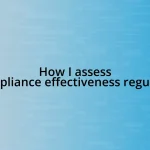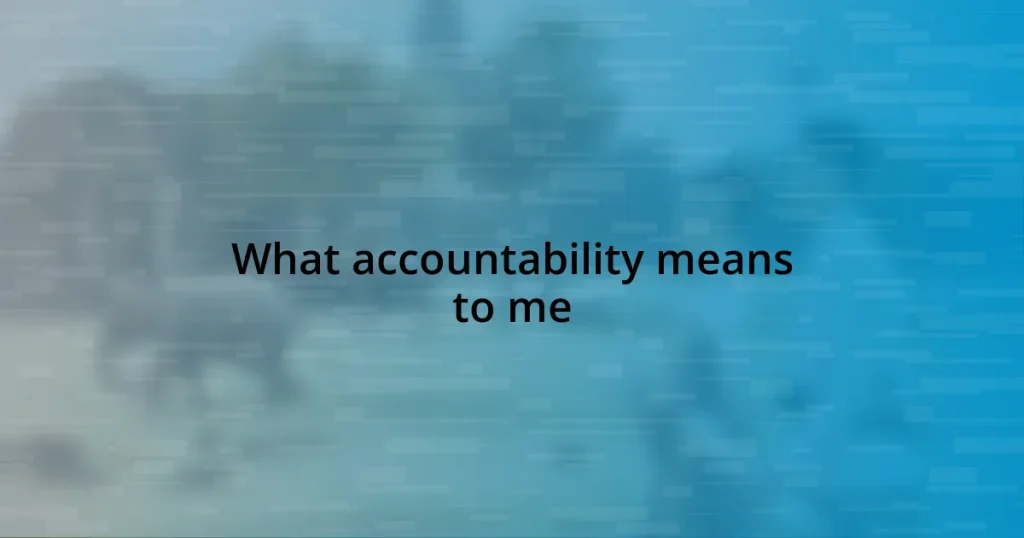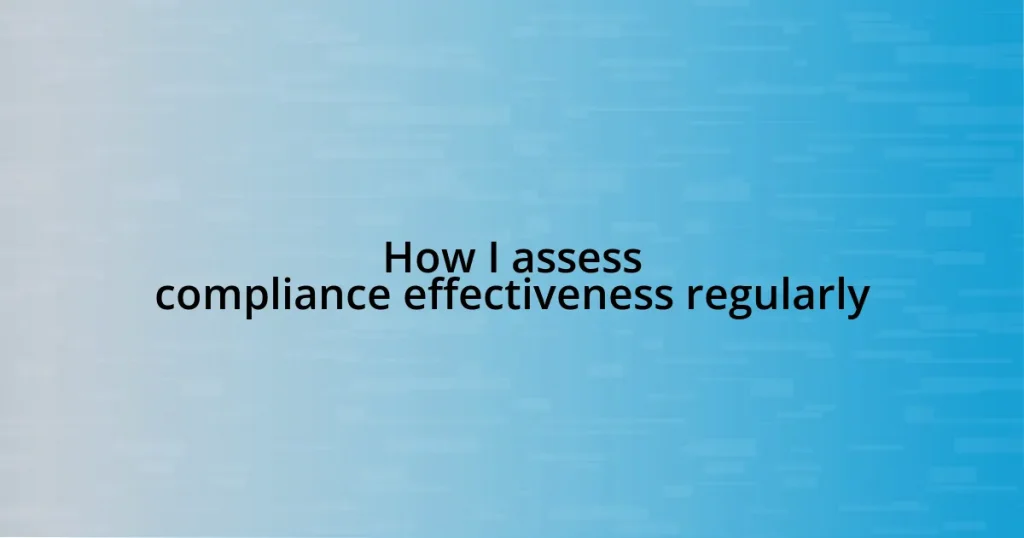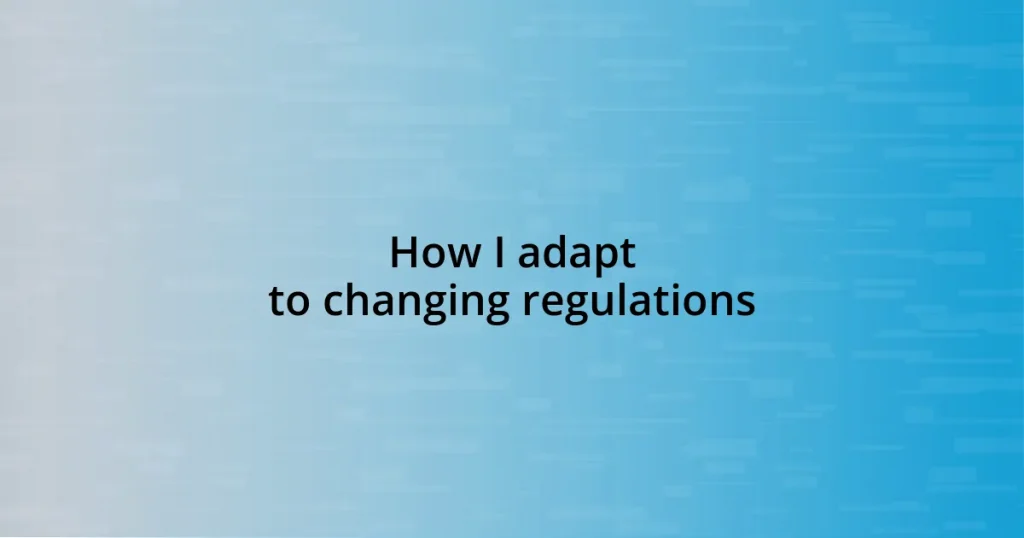Key takeaways:
- Accountability is crucial for personal growth, relationships, and workplace culture, fostering trust and collaboration.
- Setting clear goals and regularly reflecting on actions enhances personal accountability and motivation.
- Utilizing accountability partners and measuring progress through regular check-ins and metrics can significantly boost commitment and engagement.
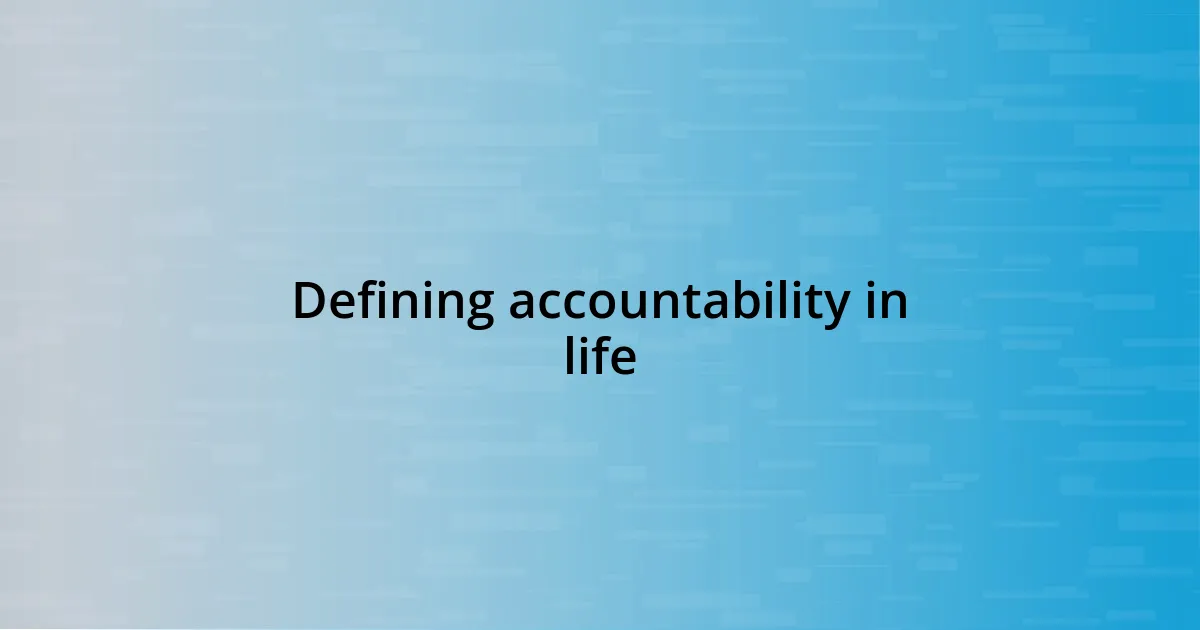
Defining accountability in life
Accountability in life is about owning our actions and their consequences, both good and bad. I remember a time when I dropped the ball on a project at work; instead of pointing fingers, I stood up, accepted my mistake, and learned from it. This experience taught me that facing the music is vital to growth.
When I think of accountability, I often wonder: how does it shape our relationships? For instance, I’ve seen friendships crumble when one person fails to take responsibility. It struck me how accountability strengthens bonds—when we acknowledge our faults and commit to change, we cultivate trust and respect.
Moreover, accountability is a powerful motivator. I once set a personal goal to improve my health, and I realized that sharing my journey with friends kept me on track. Just think about it—when others are aware of our goals, we’re more likely to follow through. Isn’t it fascinating how a simple act of admitting what we strive for can influence our success?
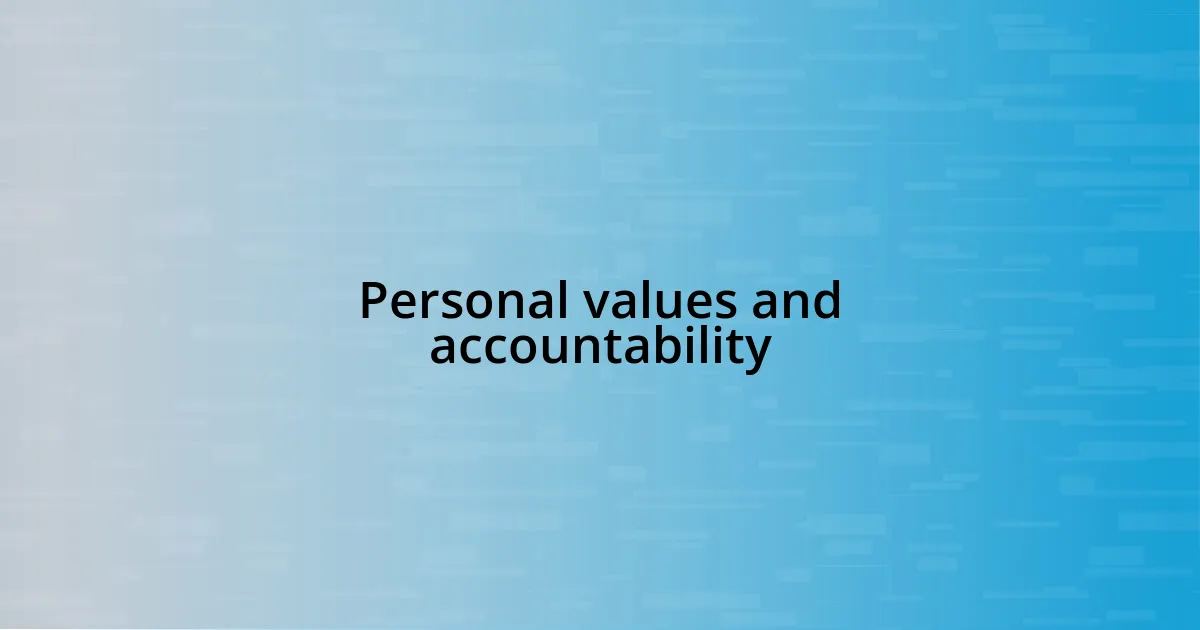
Personal values and accountability
Personal values deeply influence how we perceive and practice accountability. For me, integrity stands at the forefront. A while ago, I was entrusted with leading a community event. I realized that being accountable meant not just delivering what was expected but also aligning my actions with my principles. When I made a decision that reflected my values, even when it was tough, it reinforced my commitment to transparency and honesty.
- I believe accountability means standing up for what I value, even if it’s uncomfortable.
- Trust develops from consistently holding myself accountable to others and to myself.
- When values are clear, the path to accountability becomes easier to navigate.
- My experiences have taught me that accountability isn’t a burden; it’s a pathway to authenticity and growth.
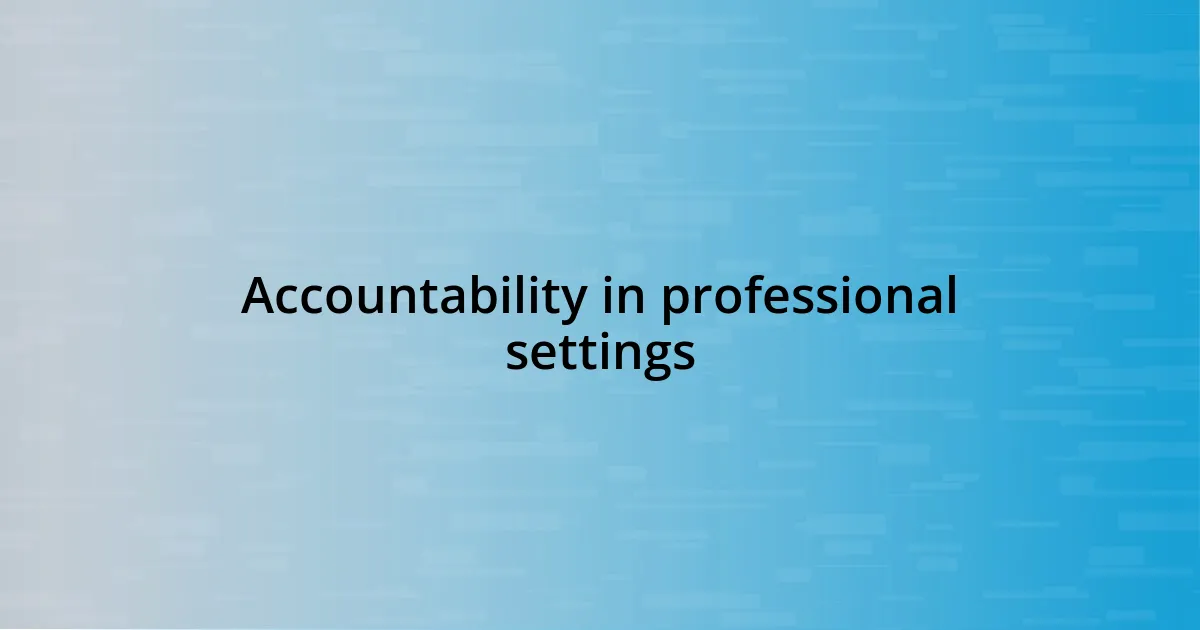
Accountability in professional settings
Accountability in professional settings is essential for fostering a positive work culture. I remember working on a team project where deadlines were tight. When team members openly discussed their responsibilities and admitted challenges, we could assess the situation together. It was refreshing to see how honesty about our shortcomings turned into a collaborative effort; accountability created synergy among us.
In the workplace, accountability also enhances performance. I once faced a situation where I had to tackle several tasks but mismanaged my time. I took it upon myself to communicate with my supervisor, and it led to a constructive meeting where we re-evaluated priorities. This experience reminded me that accountability isn’t just about accepting blame; it’s about collaborating to find solutions and improve outcomes.
Moreover, accountability builds trust within teams. When leaders hold themselves accountable, it fosters an environment where everyone feels empowered to do the same. I’ve experienced this firsthand when a manager openly shared their own setbacks and lessons learned. It made me feel safe to express my concerns, knowing that we were all in it together. This openness can lead to stronger team dynamics and a more engaged workforce.
| Aspect | Accountability in Professional Settings |
|---|---|
| Communication | Fosters open dialogue and problem-solving |
| Performance | Encourages individuals to take responsibility for their tasks |
| Trust | Builds stronger relationships through transparency |
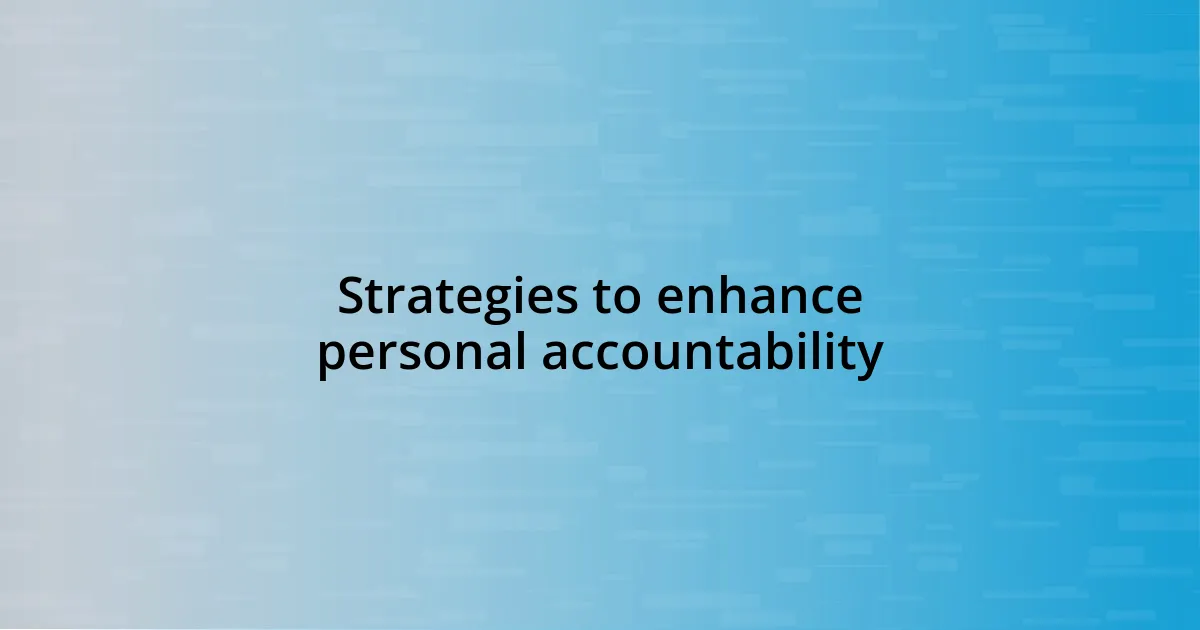
Strategies to enhance personal accountability
One strategy to enhance personal accountability is to set clear, measurable goals. I often find that when I break down larger objectives into smaller tasks, I become more focused and motivated. For instance, when I aimed to learn a new skill, I dedicated specific time blocks each week to practice. This clear timeline kept me on track and made it easier to assess my progress.
Another effective approach is to regularly reflect on your actions and decisions. I keep a journal where I write down my thoughts about what I’ve accomplished and where I faltered. This practice not only helps me identify patterns but also encourages honesty with myself. Have you ever noticed how revealing it can be to put your thoughts on paper? It’s like holding a mirror to your daily choices and seeing the areas where you can improve.
Lastly, finding an accountability partner can significantly boost your commitment. I once partnered with a colleague, and we held each other to our goals by checking in weekly. This arrangement made me feel supported and less isolated in my journey. Who wouldn’t appreciate a little encouragement along the way? Together, we celebrated small wins, which made the process enjoyable and reinforced our dedication to being accountable.
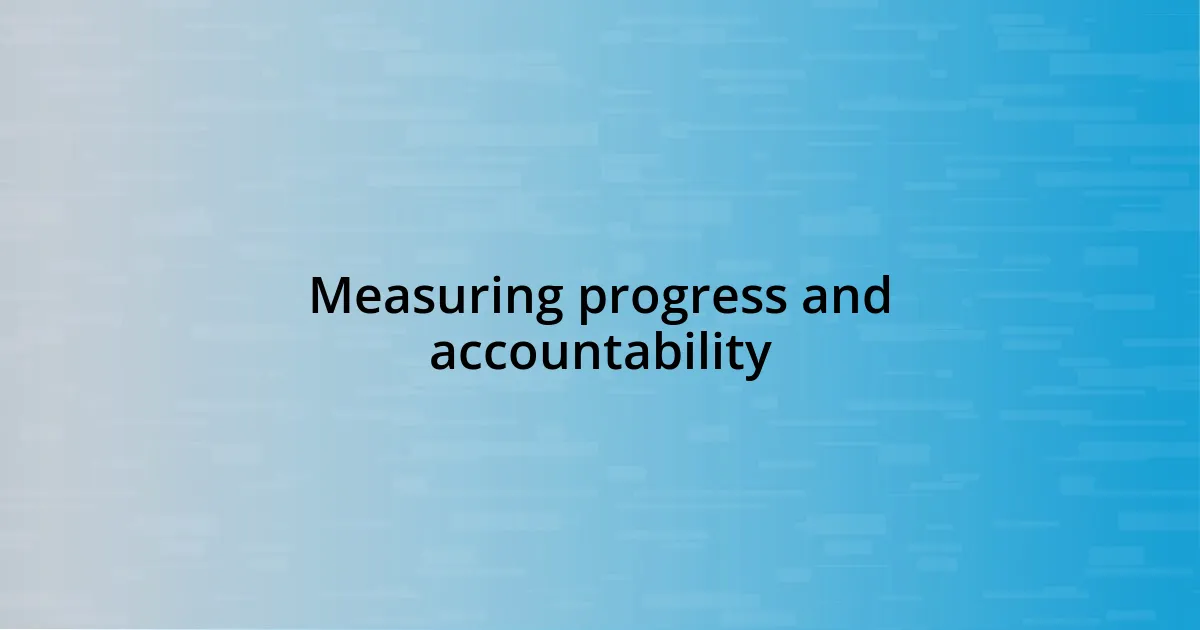
Measuring progress and accountability
Measuring progress and accountability can often feel like a balancing act, but I find that regular check-ins bring clarity. For instance, during a recent project, I established a bi-weekly review with my team. We shared our progress and not only did it hold everyone accountable, but it also created a space for celebration. Have you ever noticed how acknowledging even small victories can boost motivation?
I’ve also learned the power of metrics in tracking accountability. When working on personal projects, I use a simple chart to visualize my tasks. It’s amazing how satisfying it is to see those boxes checked off. Each checkmark serves as a reminder of the effort I’ve put in. Doesn’t it feel rewarding to have tangible evidence of your progress?
Furthermore, transparency in sharing outcomes with peers is pivotal. I once participated in a group where we openly discussed challenges and wins. This openness not only fostered a shared sense of responsibility but also inspired others to contribute more actively. Have you ever thought about how collective accountability might elevate group dynamics? That experience taught me how much more committed we can be when we know we’re all rooting for each other.

